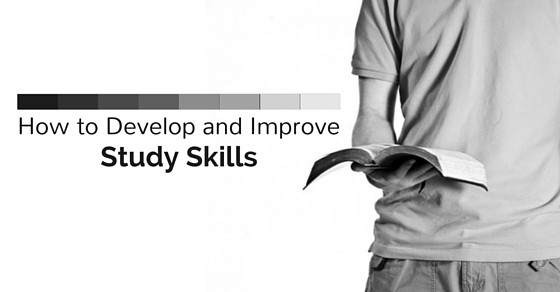It is always advisable to prepare for tests or exams way in advance rather than just a night before. This is best exam tip that always works well. According to a study, around 50% of what we learn is forgotten within 20 minutes. And the rest 25% in the next 24 hours. This means that in a month’s time, you may completely forget all what you had studied and prepared.
So for each one of us, our brain needs a timely review of what we have studied. It does not matter whether you are a student or graduate, retention of memories in one way or the other is always mandatory. Effective study skills not only improve your productivity but also help in scaling grades. Here are few of the effective and best study techniques for students and graduates to improve study skills.
 Highly Effective Study Habits:
Highly Effective Study Habits:
The following mentioned are few best study tips on how to improve study skills and study habits effectively.
1. Get A Feel of your Syllabus:
It is always important to develop a feel for the content of a book before studying it. Such tactics work as an extra edge over the knowledge needs. You can do it by initially going through a table of content, illustrations, diagrams or glossary etc. You need to know what all is included in your syllabus and what are the diverse topics covered.
While surfing through the topics, try to guess what each topic could actually include. When you actually start studying the chapter, compare and see whether your judgments and assessments were right. This is a simple way to sharpen your memory on the subject.
2. Prepare the Perfect Study Ambience:
You should put extra care to create an appropriate study environment. It should have enough sunlight, comfortable furniture and very less noise. It is like arranging everything you need before you start like notebooks, papers, text books, pencils and pens etc. A neat and tidy room is always conducive for study purposes. Proper lighting and ventilation are vital in a room where you study. If a room is dull and dingy, you may feel sleepy and lack the enthusiasm to study.
The room you study in should have separate space for the different documents and books. It should also include a study lamp. It is best to opt for ergonomic chairs that are convenient and reliable. Such chairs would not ruin your posture and ensure you are able to study well. You must ensure that the position in which you sit and study for exams is convenient for you.
3. Get Rid of Distractions:
Very often, students get carried away by distractions and lose the mood to study. Try to avoid distractions as much as you can. Kids in the family often cause a lot of distraction while you are studying. If you have younger siblings or kids at home, place a do not disturb board outside your room so that they do not enter.
If you have any such friend or family member who tends to disturb you while studying, it is preferable to politely ask to leave. Other things that usually distract the young students are mobile phones and computers. The updates on WhatsApp and similar other apps can be a vital distraction. It is best to keep the conversations on these apps mute while you are studying.
4. Create a Proper Study Schedule:
It is a known fact that if you schedule your study activities and adhere to it, you tend to gain more through your studies. Most of the times, we are running short of time while struggling with study and assignments. So it is always advisable to pre schedule the classes, assignments and other key dates.
Even as a part of this schedule, you should set aside specific timings for study as well. More comprehensive your schedule is, more efficiently you will be able to complete work on time. If you develop the habit of creating a study timetable for all your study activities and continue this habit later in your career to, it is bound to be very helpful. Proper scheduling ensures that you gain maximum from the time you invest in your studies.
It also helps in developing some time management skills. It is known that individuals with better time management skills prosper more in their career.
5. Notes Help To Strengthen Memory:
It is scientifically proven that people tend to remember things better if they have noted it down physically. To retain things for a longer span of time, it is always preferable to take notes while studying. Recording information helps us to organize work and demonstrate vital points in the material. Notes need not be too elaborate. The notes are usually concise and focus just on the major facts. These act as highlights to what you have just learned and can prove to be a great asset when you try and revise after your studies.
6. Breaks are Important:
Studious or dedicated individuals often assume that breaks are a waste of time. Sometimes in a hurry of doing things on time, you find yourself boggled with time. So it is always necessary to take frequent breaks like go for a walk, ride your bike or just be with the family. Breaks help you refresh and rejuvenate. It helps your mind think better and attain clarity for your thoughts. You may take breaks in every hour or in a couple of hours. Make sure the break does not exceed the intended time or you do not lose your focus.
In your break, you may opt to exercise. This way your body will remain fit too. Avoid munching in every break you take. Students usually tend to grow fat because of their habits of frequent eating. If you really wish to eat during breaks, opt for salads that add to your health.
7. Questions Help you Understand the Subject Better:
Always ask questions about the schedules, assignments and study to understand the matter of subject. For a beginning, you can consider questions given in the start or end of a subject. When you ask a question, you understand the relevance of the subject. It is a known fact that students who tend to ask more questions are known to be more studious. They usually perform better in exams and score well too.
Many students have queries and doubts but fail to ask questions in class or while the lessons are on. This is probably because they have stage fear or some similar mental block. You need to get over such fear if you have any. This may seem like a small fear but it will prevent you from progressing in your career.
8. Organize the Study Agenda in the Reverse Order of Toughness:
How you plan your study schedule also affects your performance. So make it a point to plan well so that you excel in your studies. Try to start with the hardest material you need to do. More over if you start with the tough subjects, this will freshen your brain.
A common tendency among students is to get exhausted by the end of the day. When you are exhausted, you tend to think slowly and cannot comprehend tough subjects. This is an ideal time to study simple things that are really easy to grasp.
9. Regular Revision Helps:
Along with critical reading skills and test taking study strategies, give the noted material review on regular basis. Once you complete one chapter, just read out loud the highlighted material at the end. You may go through the quick notes you have prepared at regular intervals. This will help you get better acquainted with your subjects and sharpen your knowledge.
10. Don’t Just Rely on Memory But Also on Reasoning:
Many students have the habit of mugging up the theory in their books without spending a time to understand what is written. This is really a bad habit. Memorizing works only for a small duration but if you understand a subject logically, it will stay in your mind forever. So try to analyze a subject logically. Try to understand the whys and whats of a subject. This will give you deep insight on the subject and provide knowledge that will last a lifetime.
11. Studies and Their Significance in Your Life:
Studies play a vital role in framing your career properly. Today there is really no place for mediocre in the market and you need to really excel to prosper and make a fine career. Each time you clear an exam in flying colors, the certificates and medals pave way for a better opportunity in the job market. Today, every firm is looking for something extra and you can’t have that extra bit unless you excel in your career.
Finally:
Studies are important not just while you are in school or college, it plays a vital role throughout your life. If you inculcate fine learning skills or habits right from the start, learning will really be a cakewalk throughout your life.







































